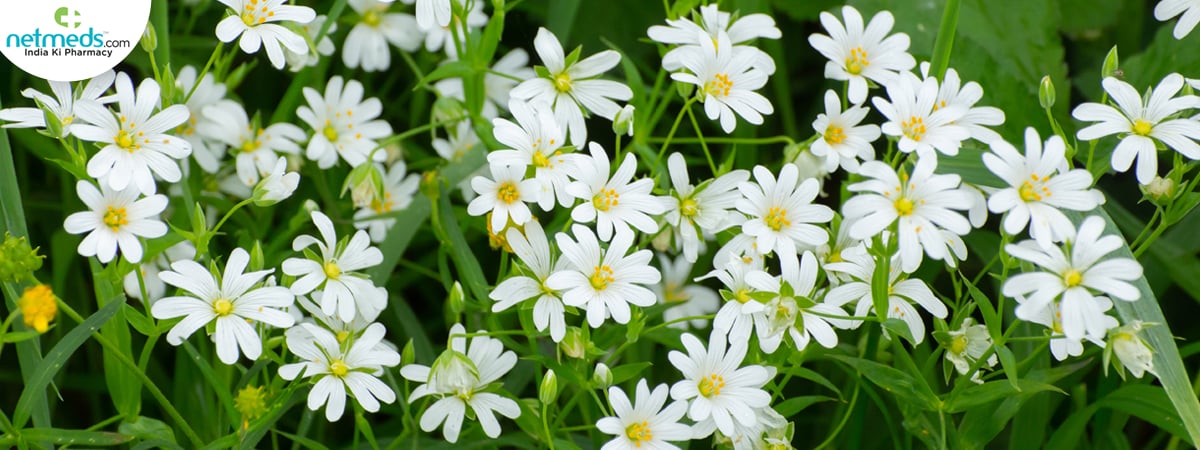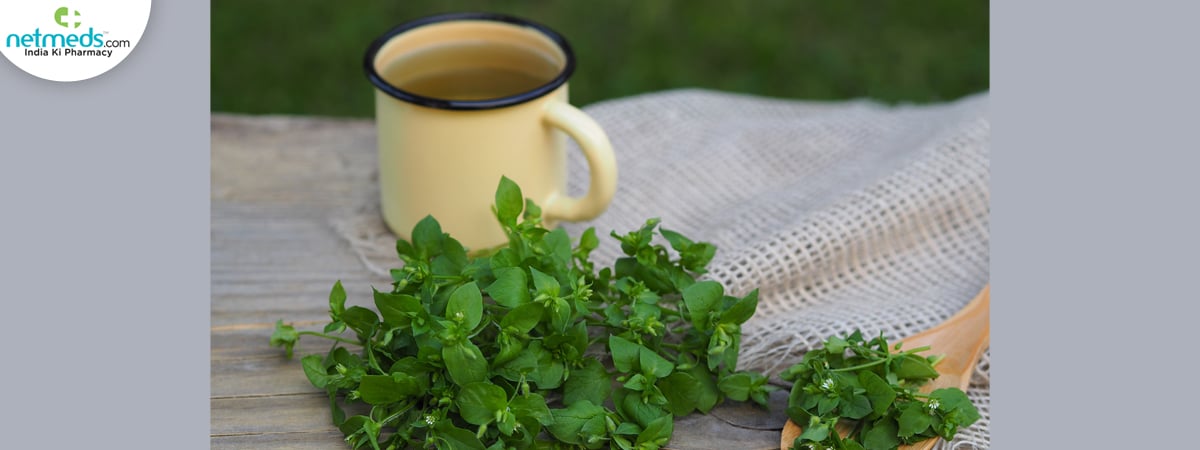A small, nutrient-dense herb from temperate regions worldwide, Chickweed, botanically called Stellaria media (often dismissed as a garden weed), is a fragile plant that grows abundantly in Europe, North America, and parts of Asia. Cherished for centuries in herbal medicine for its superb healing properties, chickweed has white star-shaped flowers and tender green edible leaves. Traditionally, it has always been used to calm skin irritation, ease inflammation, and support digestive health. Whether consumed fresh, brewed into tea, or applied topically as a salve, this unassuming plant offers a wealth of health benefits. Let us explore more about this rare but important herb in this short read.
Also Read: 5 Must-Try Herbs: Boost Your Health, Immunity, And Heal Naturally - Infographic

Nutritional Profile And Benefits Of Chickweed
Several essential nutrients make chickweed an edible, nutritious, and powerful addition to a natural wellness routine. Its leaves and stems are rich in vitamins A and C, iron, magnesium, calcium, and zinc. These nutrients contribute to its restorative and immune-boosting properties. Here are its top health benefits:
Supports Digestive Wellness
Mild diuretic and gentle laxative, when taken internally as a chickweed tea or tincture, the herb supports healthy digestion, eases bloating, and assists in the elimination of toxins through the urinary system. Its high fibre content also contributes to better gut function.
Promotes Skin Health
One of the most celebrated chickweed benefits is its soothing effect on the skin. The herb has a cooling and anti-inflammatory nature. This helps to calm conditions such as eczema, rashes, psoriasis, insect bites, and minor burns. Chickweed salves or poultices can reduce itching, redness, and irritation, making it a staple in natural skincare.
Mitigates Mild To Severe Inflammation
Chickweed contains bioactive compounds such as saponins and flavonoids, which help reduce inflammation throughout the body. These compounds are believed to soothe joint pain and arthritis symptoms when used regularly.
May Help With Weight Management
Traditionally, chickweed has been used as a natural metabolism booster and appetite suppressant. While scientific evidence is limited, herbalists often recommend chickweed tea to support detoxification and healthy weight management.
Bolsters Youthful Appearance
The high antioxidant content in chickweed helps combat free radicals, reducing oxidative stress, which can cause wrinkles and signs of early ageing. Including chickweed in your diet or skincare routine can support overall vitality and also delay ageing signs.
Shop From Our Wide Range Of Top-Selling Digestive Supplements To Boost Gut Health!

What Are Some Common Uses Of Chickweed?
Chickweed’s versatility allows it to be used in the following ways, both internally and externally:
Chickweed Tea: It can be brewed from fresh or dried leaves for a soothing, detoxifying drink.
Salves and Ointments: The herb is infused into several skin healing ointments and can be applied to the skin to reduce irritation and promote healing.
Skin Poultices: Fresh leaves of the herb can be easily crushed and placed directly on wounds or inflamed areas.
Tinctures: Concentrated extracts can be used in small doses for external and even internal health support after recommendation from a health care provider
Culinary Uses: Fresh chickweed can be added to salads, soups, and smoothies for a nutritious boost.
Precautions And Side Effects When Using Chickweed
While chickweed is generally safe for most people, before adding it to your health routine, consult an herbalist or healthcare professional to ensure safe and effective use. Here are some precautions that should be considered:
· Some people may experience mild skin irritation or allergic responses. Always perform a patch test before topical use.
· Large amounts of chickweed, especially raw, can cause stomach discomfort or diarrhoea due to its saponin content.
· There is limited research on chickweed’s safety during pregnancy or for lactating mothers, so it is best to consult a healthcare provider before use.
· Chickweed’s mild diuretic properties may interact with certain medications, so professional advice is recommended.
Frequently Asked Questions
What is chickweed used for?
Chickweed is commonly used in herbal medicine to soothe skin irritation, reduce inflammation, and support digestion.
Can chickweed be eaten raw?
Yes, chickweed leaves and stems are edible and highly nutritious. They can be added to salads, soups, and smoothies for a boost of vitamins and minerals.
How do you make chickweed tea?
To make chickweed tea, steep one or two teaspoons of dried chickweed in hot water for about ten minutes. Strain and enjoy as a detoxifying, anti-inflammatory herbal drink.
(This content is reviewed by Kalyani Krishna, Chief Content Editor)
Author Profile: Preeti Sharma
Preeti Sharma has a Master's in Electronic Media and Mass Communication and certification in short-term writing from Florida. With close to a decade of experience, she specializes in crafting engaging blogs on beauty, veterinary care, and healthy cooking. Preeti is proficient in video editing tools and produces captivating and informative content across multiple platforms.
References:
Stellaria media (L.) Vill.- A plant with immense therapeutic potentials: phytochemistry and pharmacology
Oluwole Solomon Oladeji a, Abel Kolawole Oyebamiji
https://pmc.ncbi.nlm.nih.gov/articles/PMC7284062/
https://www.allstudyjournal.com/article/1253/6-8-15-200.pdf



 Previous
Previous